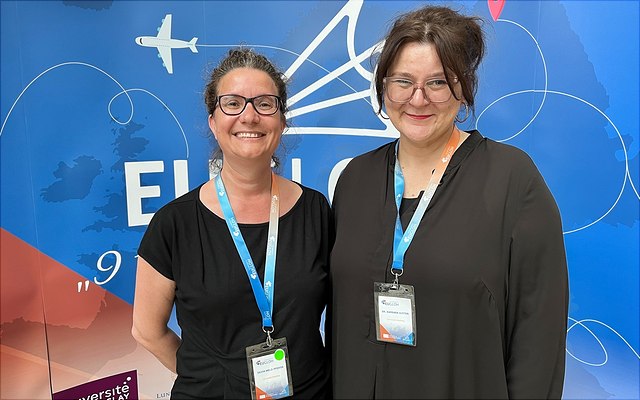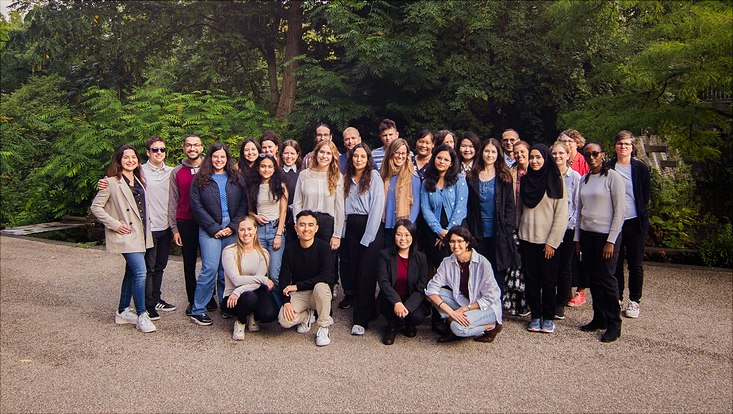University of Hamburg Contributing to the Discussion at the 2024 EUGLOH Annual Summit
26 September 2024, by Abt. 5, Team EUGLOH

Photo: EUGLOH, University of Szeged
The fourth Annual Summit of the European University Alliance for Global Health (EUGLOH) brought together a diverse group of over 400 participants at the University of Szeged in June. The University of Hamburg’s Prof. Dr. Silvia Melo-Pfeifer and Dr. Barbara Sutter were among the event’s speakers, contributing insights from their fields to EUGLOH’s interdisciplinary exchange on the topic of global health.
Global health is influenced by a wide range of factors – ranging from the environmental to the political, from the societal to the scientific – making it a transdisciplinary concept by nature. This interplay of numerous fields of research and various groups of societal actors was reflected in the diversity of the attendees at this year’s Annual Summit of the European University Alliance for Global Health (EUGLOH). Participants included delegations from EUGLOH’s partner and associated partner universities, representatives from research institutes and international agencies such as the World Health Organization, along with Nobel Prize-winning researchers Katalin Karikó and Anne L’Huillier from the natural sciences.
The University of Hamburg, one of EUGLOH’s nine partner universities, had a prominent role in bringing interdisciplinary perspectives to the conference agenda, with Prof. Dr. Silvia Melo-Pfeifer from the Faculty of Education and Dr. Barbara Sutter from the Faculty of Business, Education and Social Sciences as well as the Knowledge Exchange Agency both speaking during the event. In their talks, they highlighted various aspects of the media and research landscapes as they relate to global health – from the public discourse on health-related topics to the career paths of researchers contributing to scientific advancement.

In her plenary lecture, Prof. Dr. Melo-Pfeifer, who held two talks at the conference, addressed how the discussion of public health issues was impacted by politically and ideologically motivated “fake news” during the Covid-19 pandemic. In a two-year Erasmus+ project, Prof. Dr. Melo-Pfeifer worked with universities in Spain, Portugal and the Netherlands to analyze instances of fake news in four different languages in order to recognize patterns – especially with regard to the representation of migrants and minority groups – in various types of pandemic-related fake news and to develop corresponding resources for educators and future teachers on the topic of digital literacy.
After returning to Hamburg, Prof. Dr. Melo-Pfeifer said that she “noticed an authentic interest and connection” to the topic of fake news at the conference and felt that it was “perceived as urgent in terms of global health issues,” including being mentioned in other participants’ discussions. In her second talk at the conference, she shared her experiences with mentoring in international contexts as part of a session devoted to the topic of mentoring.
Just as mentors influence the career development of researchers in various fields, the working conditions in which doctoral and postdoctoral researchers find themselves also have an impact. In her presentation at the Annual Summit, Dr. Sutter highlighted a project at the University of Hamburg focusing on specific measures to increase career opportunities – with an additional focus on fostering and retaining new recruits – for early career researchers at various stages of their careers. The project also addressed alternative paths such as fast-tracked routes to a doctorate or career opportunities outside of academia.
International exchange is also interesting with regard to career topics and how they are dealt with at universities, emphasized Dr. Sutter as part of feedback after returning to Hamburg. “It allows conclusions to be drawn about how universities position themselves, how they see their role, what they want to achieve – be this rooted in nationally different traditions or fueled by innovative approaches,” she said, adding that institutions can inspire each other by seeing what each has to offer.
With this interdisciplinary and international approach, the 2024 EUGLOH Annual Summit provided participants with a unique opportunity to contribute from a range of research disciplines and set their future collaboration and exchange in motion.
“You have to move beyond the frontiers of your field and think – how can I connect to other researchers working in other areas? It really improves your cognitive and academic flexibility,” said Prof. Dr. Melo-Pfeifer. “And I like this very much about EUGLOH.”


